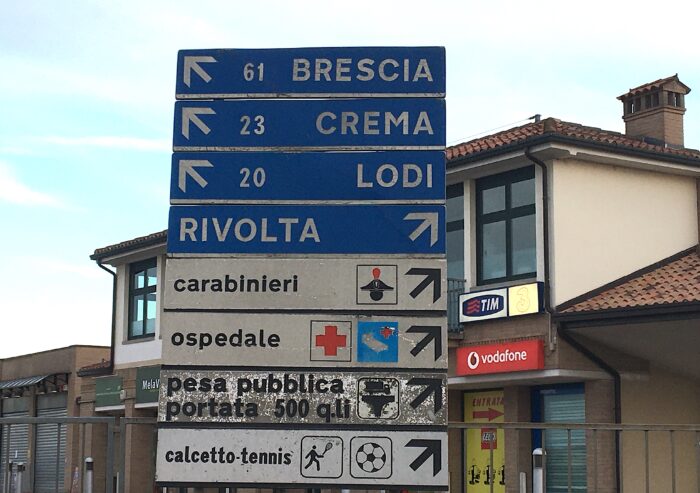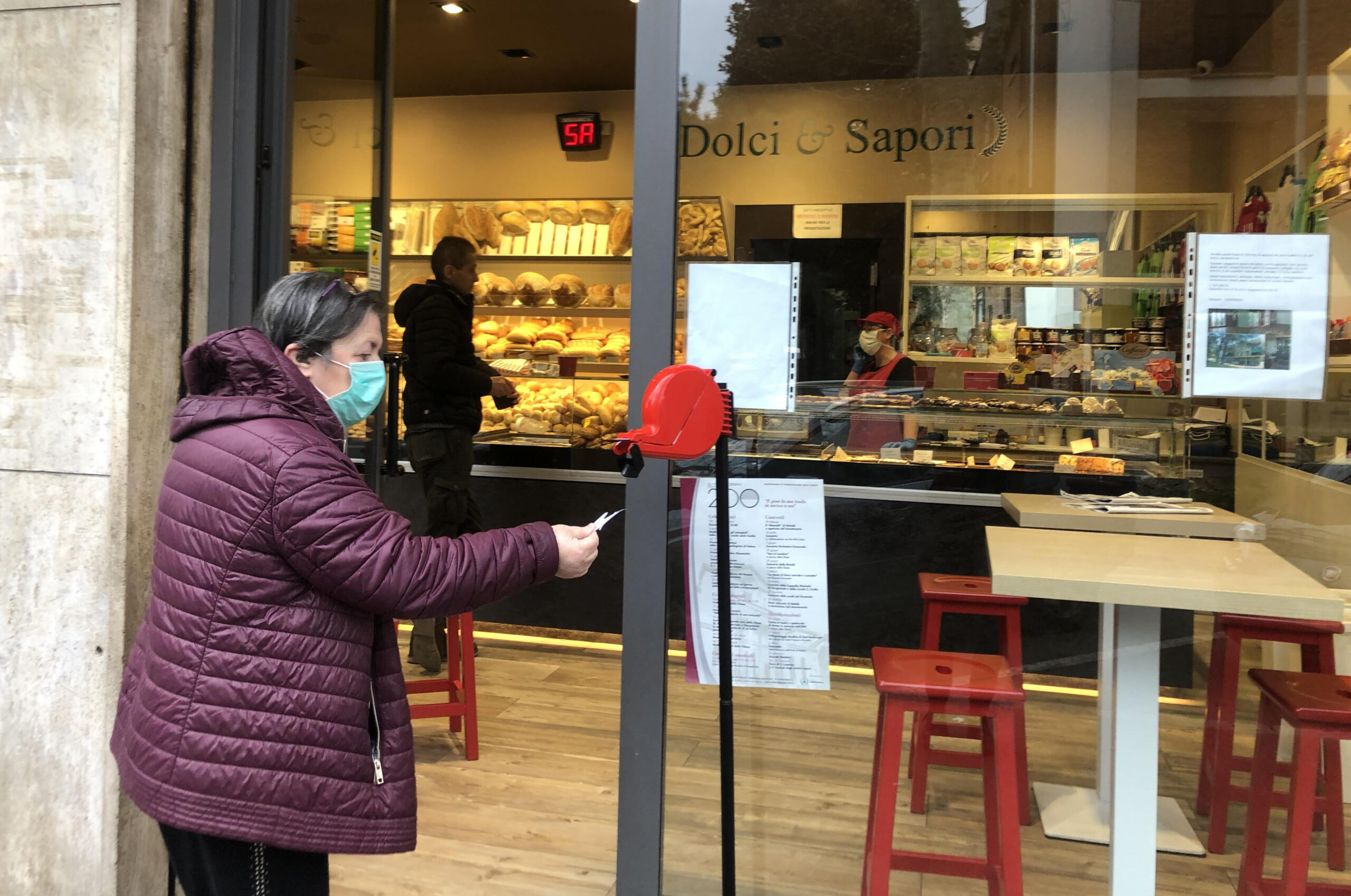It’s time to re-think what it means to be prepared to face threats, and what type of political and economic institutions we need to do so, writes Andrew Spannaus.

Shoppers line up at a supermarket outside of Milan. (Andrew Spannaus)
By Andrew Spannaus
in Milan
Special to Consortium News
 Three weeks have passed since the first restrictions were announced in Northern Italy to combat the spread of the novel coronavirus; three weeks in which things have gotten much worse, quickly, making Italy the second hardest-hit country in the world at this point.
Three weeks have passed since the first restrictions were announced in Northern Italy to combat the spread of the novel coronavirus; three weeks in which things have gotten much worse, quickly, making Italy the second hardest-hit country in the world at this point.
As of March 16, almost 28,000 people were known to be infected and over 2,000 deaths were attributed to COVID-19. The numbers have shot up over the past week, although cases are still low in many areas of the country, and the initial centers of the infection — a few small towns about 40 miles southeast of the metropolis of Milan — have seen almost no new cases in the last few days.
The whole country is now on a sort of lockdown: schools and churches are closed, as are restaurants, bars, and all other retailers except for food stores, pharmacies, and a few other “necessary” shops. Yet numerous companies remain open, so while remote work is encouraged as much as possible, many still go to work; and public transportation is still running. So “social distancing” here is not yet as severe as in Wuhan, the initial source of the outbreak in China.
Indeed, in addition to food shopping, people go out for walks or exercise, although police are now driving around telling everyone to “stay home,” the basic message transmitted at all levels of the institutions now.
From Reluctance to Rationing
These measures were adopted by a “prime minister’s decree,” an order drawn up by the head of the national government, only on March 11, some two and a half weeks after the initial reaction that focused on just a few hotspots in the Lombardy and Veneto Regions.
A process of escalation ensued in which additional measures were added repeatedly, as it became clear that the contagion was not at all under control.
So, until just a few days ago — and to a certain extent even now — the lockdown basically relied on people acting responsibly. This was a problem at the beginning in particular, because the message was muddled. Many people claimed that panic was worse than the virus itself, with various politicians and even some medical professionals saying “it’s just the flu.” And this didn’t come mostly from “populists” or “conspiracy theorists,” but from center-left political figures who branded calls to quarantine people arriving from China as racist, or cavalier professionals who figured this was just another example of people getting freaked out without taking a serious look at the data.

Signs for road to Lodi and Crema, the area of the first known outbreak in Italy. (Andrew Spannaus)
That’s over now. The reality, which competent officials had tried to impress from the beginning, is that the health system is being overwhelmed. In Lombardy, the richest and most populous region in the country, there aren’t enough intensive-care beds to treat those who need serious medical attention. Dozens of people are now being transferred to other regions by ambulance or plane, and a crash program is underway to build a temporary hospital in the buildings of the Milan trade fair. More doctors and nurses are needed, and there aren’t enough protective masks and respirators. The system is on the brink, and if things get significantly worse in other regions, it could go over the edge.
There are already cases of hospitals having to choose among patients based on age and probability of survival, while a protocol is reportedly being drawn up that essentially sets an age cut-off of 80 for intensive care treatment once the hospital system reaches capacity; triage is returning to its meaning in times of war.
Amid all this, testing is still not wide scale, with authorities usually citing the lack of available resources. For example, even after two cases of COVID-19 were found at a microelectronics company that employs more than 5,000 people here in Lombardy, the company has continued production shifts and not tested workers. Indeed there is still no requirement to do so, and no distribution of test kits. But if you want to stop the spread, it would seem smart to figure out who has the virus now, wouldn’t it? South Korea took this approach, with a success that other countries haven’t had yet.
For most people, the virus seems to be a mere inconvenience though, a far cry from the plagues or wars of our ancestors. We have to stay at home, deal with kids’ pent-up energy, and wait in line to get into the grocery store; all while constantly attached to our phones and computers, of course. Initially some people hoarded items from supermarkets but in general there are no shortages of food or other items in stores.
The average age of those who die here is slightly above 80, and although younger people do get sick, the likelihood of serious consequences is low enough that generally healthy people don’t feel particularly threatened. This contributed to the dangerous initial reaction claiming the virus really isn’t that bad.
While it might not bother those who take a Malthusian view of humanity, in today’s society we can’t simply accept the idea that our parents and grandparents are at risk of early death due to a new disease.
Indeed, as the number of victims rises, attitudes are changing. A man who lives in a building just behind my house is hospitalized, and the mother of a friend of mine from Bergamo passed away two days ago. It’s no longer an abstract threat. As deaths rise in some areas, funerals are prohibited.
Questioning Our Health System
The situation raises all sorts of questions regarding the health systems of advanced countries. People love to say that Italy has an excellent system, but that’s not very reassuring when there aren’t enough ventilators — only one company here produces them — or masks, which are just now starting to arrive from… China.
As in the United States, the issue of economic security is coming to the forefront. How safe are we if we depend on a fragmented global supply chain for essential needs? The need to rebuild our manufacturing base after the loss of jobs due to the outsourcing of production to low-cost countries was already a general topic of discussion. Now the question of maintaining essential industries becomes even more evident.
So is the question of budget cuts, even in a system considered to maintain a high level of care overall. In order to comply with the European Union budget criteria, Italy has undergone several waves of austerity over the past 30 years. In just the past 10 years, the country has lost over 70,000 hospital beds, and now its beds-per-capita figure is half that of France and 40 percent of the level in Germany. Health spending has increased in absolute terms, but in reality, every year the state allocates less money than is estimated to meet the needs of an aging population. In the general context of seeking “savings” and increasing “efficiency,” the number of intensive care beds per capita — a key factor in today’s crisis — has fallen by 60 percent since 1990.

Shopper takes a number to enter a bakery in Gorgonzola, Italy.
(Andrew Spannaus)
Nation States or the EU
Speaking of the European Union, there’s the question of the attitude of other European countries toward Italy. At the beginning, it wasn’t exactly empathetic. France, Germany and the Czech Republic initially blocked the export of masks to Italy, and there were plenty of memes circulating about the dirty, lazy Italians. That’s over now, too, as it has rapidly become clear that everyone’s in the same boat, just at different points along the curve.
Yet we can’t avoid talking about the political implications for Europe. What has become abundantly clear, as I argued in my book “Original Sins: Globalization, Populism, and the Six Contradictions Facing the European Union” last year, is that when push comes to shove, decisions are still made by nations, not supranational bureaucracies.
First of all, national governments know the situation in each country, and have the responsibility and legitimacy to act; second, the European Union is based on an economic conception that is entirely inadequate to deal with the real problems of today’s world. It was constructed to further the policies of globalization, and has done so by promoting austerity and deregulation, producing not only a decline in the living standards of the middle class, but a crushing blow to the infrastructure preparedness of many of its members. An economy based on mechanisms which extract value from the productive economy to fuel short-term financial speculation, is inherently unable to guarantee the safety and wellbeing of its citizens — on both sides of the Atlantic.
A few countries have profited from the Euro system (Germany and The Netherlands, in particular), but for most, it had negative economic effects. Now, on top of that, in order to spend money to face this crisis countries have to get permission from Brussels.
Here again, it is abundantly clear that national governments have to take the initiative, and indeed the EU is demonstrating its lack of credibility in spectacular fashion, such as when European Central Bank head Christine Lagarde said last Thursday that she has no responsibility to help countries such as Italy avoid a state bond crisis in this situation.
Today’s political institutions are clearly unprepared for this crisis, yet it was far from unpredictable. Many have warned about the risk of new diseases, not to mention how often we have heard of the threat of biological warfare.
Part of the problem is that our society has reached a level of progress that makes people think that we are immune from the type of crises that have affected humanity over centuries and millennia. Once again, reality is asserting itself, and showing that no, we are not at The End of History. It’s time to re-think what it means to be prepared to face threats, and what type of political and economic institutions we need to do so.
Andrew Spannaus is a journalist and political analyst based in Milan. His latest book is “Original Sins. Globalization, Populism, and the Six Contradictions Facing the European Union,” published in May 2019.
The views expressed are solely those of the author and may or may not reflect those of Consortium News.
If you value this original article, please consider making a donation to Consortium News so we can bring you more stories like this one.
Before commenting please read Robert Parry’s Comment Policy. Allegations unsupported by facts, gross or misleading factual errors and ad hominem attacks, and abusive or rude language toward other commenters or our writers will not be published. If your comment does not immediately appear, please be patient as it is manually reviewed. For security reasons, please refrain from inserting links in your comments, which should not be longer than 300 words.

Most of my adult life I have been shunned anytime I spoke my mind about our Federal government, terse, vitriolic criticism for sure. Strong condemnation of the status quo.
Since the end of WWII the world nations have watch the leading economies of world indulge themselves exploiting those not so strong.
The whole sale abuse of the poor by the wealthy corporations of the wold. And then there are the wars and the surge in the technology of killing.
With all our wealth and knowledge did the U.S. ever try to lead by setting the example for others. Even once. Nope! Instead deciders of the the U.S. drummed up one shit story after another to justify traveling to the corners of the earth to wage dead and destruction, mostly on innocents.
We burnt up money killing and have allowed those abilities to be used in the pursuit of more wealth for the already super wealthy.
Now we see how all that DEFENSE money could have been better used.
All it took to aid me in making my point after 55 years of being a bitchy adult , “Old Party Pooper Bob”, was a virus. seemingly working in tandem with our SUPREME LEADER.
Our government failed us when JFK was killed, our government failed us during the Vietnam War, our government failed us by paving the way for the wealthy elitists to become super wealthy elitists, our government failed us by not preventing 911 when they should have, our country failed us when the lying 43 sent us to war with Iraq, our government is failing us now by not having the capability to deal with the madman in the White House . Who because of his “divine super intelligence” thinks he can wish this pandemic away by declaring it will be gone miraculously.
Hold it Hold it, now he says it’s bad! Only in America can such an exceptional piece of %#*& become and stay president. How can this be so? Because the order of succession to the presidency is made up of those who are as bad or worse than the Supreme Leader.
By the way Putin is still winning.
I just received a letter from the U$ government regarding “Census2020”.
In bold, capitalized print, inside bold-ink outlined box, it proclaims in English and Spanish, “YOUR REPONSE IS REQUIRED BY LAW”.
This got me thinking as things have a tendency to do, which may very well be a fatal weakness, a sort of “pre-existing condition”.
This article has had the same effect.
Anyhow, this goad led me to ponder whether the U$ government has any legal requirement to respond to defects in our political economy now so very blatantly and obviously exposed by the coronavirus, most notably our failing, failed, inadequate privatized health care $y$tem?
My mind, quite unbidden, went to a section of that famous, much lauded, often referenced “foundational” document, The Declaration of Independence. It ought be noted that a very significant difference in tone exists between that document and the even more celebrated and venerated U$ Constitution.
Doubtless, among those who may read this comment, are a number who may readily guess which section of the Declaration came to mind.
It is that section which addresses why governments are formed concerning certain “rights”, unalienable, among which are “life, liberty, and the pursuit of happiness (clearly referring to the acquisition of property and, presumably, limitless wealth and power, as the Floundering Fathers were essentially of mercenary and entrepreneurial “spirit”, which may offer a clue to the development of our current dilemma).
“That whenever any form of government becomes destructive of these ends, it is the right of the people to alter or to
abolish it, and to institute new government, laying its foundation on such principles and organizing its powers in such form, as to them shall seem most likely to effect their safety and happiness.”
Now, why might I suggest that we ought to ponder foundational principle and who, specifically, it is that government power actually protects and serves?
Again, it may be readily imagined, even hoped, that those who might read this comment will readily grasp my concern and reasons.
For years (even long before neoliberalism rose to its current tyranny), it has been rather painfully obvious to conscientious observers of our society (as well as other nations in the “west”), that the wealthy, the rich, are protected AT the expense of the many, that government largess is bestowed upon the 1%, economically, legally, and in terms of influence (and control) over policy, most blatantly obvious during the last economic “downturn”, the result of outright fraud committed by the financial elite at the continuing cost and precarity of the 99%, even as the “top” 10%, the protected managerial class, foolishly imagine that their “merit” is what endears them to the elite when it is merely their sycophantic brown-nosed, lap-dog, happy willingness to yappingly heel, uncritically and most enthusiastically.
What U$ government “RESPONSE IS REQUIRED BY LAW”, convention, or habit, to the well-being of the many?
Does a one-time, possible $1,000.00 check, when months or even years of destabilization and consequence face us all, constitute the sum total of the U$ government’s responsibility and obligation to the many?
Does that pittance exhaust the imagination and responsibility of “elected” and non-elected officialdom, to provide for the safety of the majority, the 90%?
The banks have been being bailed out for months, in the “repo” market, which is where banks lend to other banks, yet cannot, will not, without massive, ongoing monetary infusions, actually do.
And, what have U$ corporations done with the cheap, low-interest funds made available to them these past twelve years?
Did they invest in their workforce, upgrade their systems of supply and production?
No. They have used the money to buy back their own stock, Boeing being one example among many.
Incidentally, such buy-backs were long illegal, prohibited “BY LAW”.
Yet, when business demands bailouts, never a hue or cry is raised, never is it asked how such bailouts shall be paid for, or when wars are begun, and continued for generations, there is never the question of how such war-making shall be paid for, how such war-profiteering shall be justified and rewarded.
Yet we all know, too well, what is immediately voiced, by the political class, by the corporate-owned media, by the financial, military, intelligence elites, whenever policies or programs that would benefit the many are suggested.
Why, it is even said that Medicare for all, which ought to include vision and dental care, that “it will cost too much!!!” when a brief honest assessment makes clear that the current $y$tem costs much more and leaves many unprotected, even in the face of a pandemic which does affect rich and poor alike, sort of the same way that the law will punish the rich, as well as the poor, for sleeping under bridges.
Yet, a potent virus, for which none of us has immunity, is not a crass joke blatant in its hypocrisy.
True equality does not respect wealth or power, whatever some may prefer to believe.
As Andrew points out, the no. 1 thing a government should do is keep prepared to help and protect its people. Plan ahead. And I hope that was at the top of the list for the UK in leaving the European Union,
The author’s characterization of the EU, “it was constructed to further the policies of globalization, and has done so by promoting austerity and deregulation, ” is spot on. And towards that end, it disenfranchised all its citizens, and turned that power over to international capital.
Very informative. The situation in Italy still puzzles me. It seems to be affected much more than other nations. Perhaps it is just ‘further along the curve’ (why is that by the way?). Here in the US it is embarrassing to realize that if you wanted to get a surgical mask, you cannot, because there are none available. Although, Jack Ma has donated some … can we feel pathetic now?